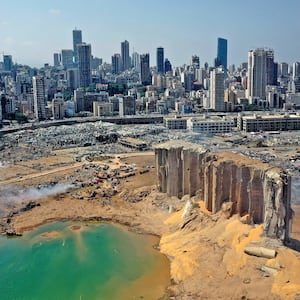Almost immediately after the devastating Tuesday explosion that nearly destroyed Beirut and killed at least 137 people, a number of verified Twitter accounts linked to Saudi Arabia started firing off tweets blaming the Iran-backed group Hezbollah.
Within 24 hours, the hashtag “Hezbollah’s Ammonia Burns Beirut” was trending, even though authorities and the group itself denies any involvement.
Intelligence sources say that the disinformation is being generated and spread by four verified Saudi-linked accounts that have been active in recent years in disinformation campaigns designed to hurt Iranian interests.
ADVERTISEMENT
Marc Owen Jones, an author and assistant professor of Middle East studies at the Hamad Bin Khalifa University in Doha, Qatar, told The Daily Beast by phone that it is coming primarily from a “core group of influencers” who have verified Twitter accounts, meaning they should have been vetted by the social-media giant. In just 48 hours since the explosion, he has already found 14,000 interactions involving 9,870 unique accounts spreading lies.
Before the Beirut explosion diverted their attention, many of these disinformation accounts were on a rampage against female journalists who were then targeted and essentially silenced out of fear to respond, he says. “This part of the general trope coming out of Saudi,” he told The Daily Beast. “Obviously the impact of that is to create a vacuum of opposition voices, filled with government mouthpieces.”
He says that as long as they are allowed on social media, “they will flourish without being controlled. They have created an ecosystem.”
The purpose is to justify to the domestic audience in Saudi Arabia that Hezbollah is a terrorist organization, not to be believed. “With these accusations, the risk is what they may spark,” he says.
But Saudi-friendly accounts aren’t the only ones engaging in this dangerous blame game, which could potentially set off new unrest. Right after the blast, a now-deleted account with more than 100,000 followers analyzed the mushroom cloud seen after the explosion and tweeted about the blast being atomic, according to the BBC.
Supporters of QAnon, the far-right deep-state conspiracy theory, are also doing their best to push the theory on Facebook and Reddit that the blast was part of a war between the Lebanese government and the central banking system.
Weapons experts have also weighed in, tweeting a barrage of dubious “proof” that the adjacent fire was not at a fireworks depot as authorities suggested, but stored a weapons cache. Dark-web sites have also been going wild with accusations that the U.S. or Israel launched a missile, going so far as to quote President Trump’s seeming “admission” that the U.S. was involved or forewarned when he referred to it as a bomb.






